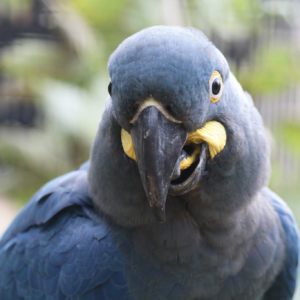
Paradise Park is a Wildlife Sanctuary in Cornwall, UK. It is home to many endangered species, but of particular interest to us is their conservation effort for a relatively new group of Lear’s macaws (Anodorhynchus leari).
The Lear’s Macaw is found in northeast Brazil, roosting in communes at the top of sandstone ravines. They live in a very unique, dry, and thorny scrub terrain. They have a similar appearance to the Hyacinth macaw, with a slightly different shade of blue and a less powerful beak, but they are equally majestic and gregarious.

Like many macaws, Lear’s macaws feed off of very specialized palm nuts, fruits, and flowers. This means their habitats are also specialized and need protection for this rare species to survive. CITES puts them on Appendix I, which means that trade is only permitted in exceptional circumstances.
On the IUCN Red List, they are listed as Endangered, which means their population is globally threatened. In 2018, the Lear’s population was thought to be fewer than 1,700. Like so many other parrot species, they are threatened by habitat loss, the illegal pet trade, and reduced genetic diversity.

Lear’s macaws at the Park originated from a group smuggled into the UK in the 1980s and seized by Custom’s officials. They were kept away from the public view and did produce some offspring. Then in 2023 the organization housing them closed down all of its aviaries. The birds urgently needed rehoming. This is when they found refuge at Paradise Park, which built a set of aviaries just for them. As the only Lear’s macaws in the UK, their preservation is critical. “These are important birds, an Endangered species threatened by habitat loss, hunting, and the wild bird trade,” explained David Woolcock, Curator of Paradise Park. “We are proud to be the only sanctuary in the UK to house them. Our objective is to provide a safe and nurturing environment that helps each bird express their unique character.”


Conservation efforts for the rarest species often depend on facilities that have captive breeding programs like Paradise Park. Such efforts hope that offspring raised naturally by their parents may eventually be released back into the wilds of Brazil, thus giving a boost toward repopulating the species.
Paradise Park, in collaboration with the World Parrot Trust (WPT), worked together to create new aviaries for these birds. The WPT was actually founded at Paradise Park in 1989, and it is actively involved in conservation work for Lear’s Macaws in their native Brazil as well.
Future plans for these magnificent birds may include reintroduction into their native habitat as part of the larger conservation project which has studied the species, its food, breeding, and threats for many years. This month’s Lafeber grant goes to help support the breeding program of these rare Lear’s Macaws, with the goal of creating younger generations that can make their way back home.
